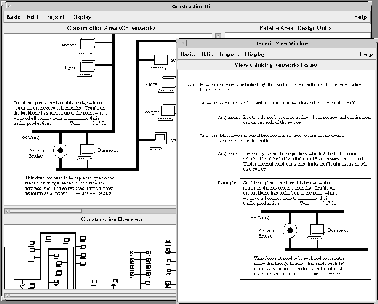The Hyper-Object Substrate: Hypermedia Supporting Incremental Formalization
Frank M. Shipman III
Department of Computer Science
Texas A&M University
College Station, TX 77843-3112
E-mail: shipman@cs.tamu.edu
A number of systems have been built that integrate the knowledge
representations of hypermedia and knowledge-based systems.
Experiences with such systems have shown users are often unwilling to
use the semi-formal mechanisms of such systems leaving much structure
implicit rather than use the formal mechanisms provided
[Shipman & Marshall 1994]. The problem remains that it is hard (1)
to encode knowledge in the formal languages required by
knowledge-based systems and (2) to provide computational support using
the semi-formal knowledge found in hypermedia systems.
As a result of this problem, we have investigated a process of
incremental formalization -- where users enter information
into the system in an informal or semi-formal representation and
gradually formalize it over time. This process allows for
formalization to be demand driven, thereby not requiring effort of
users prior to their acquiring benefits, and to be actively supported
by the system, thereby reducing the difficulty of formalization for
users [Shipman & McCall 1994].
The domain-independent Hyper-Object Substrate (HOS) integrates
hypermedia and knowledge-based system styles of representations in
such a way as to enable the incremental addition of formalism to any
piece of information in the system. The use of a single
representation for all information, not one representation for
hypertext and another for formally represented domain knowledge, keeps
users from needing to move to another part of the system in order to
formalize information.
HOS actively supports incremental formalization with a set of tools
that suggest new formalizations for addition to the information space.
These suggestions are based on patterns in the informally and
semi-formally represented information and the existing formalized
knowledge in the information space. Suggestions need not be
completely accurate to aid the user; suggestions provide a starting
point which can be edited, thus changing part of the process of
formalization from creation to modification.
 Figure 1: Combination of design specification and design discussion
in XNetwork.
XNetwork, an environment supporting computer network design, is one of
several applications to be developed with HOS. Figure 1 shows the
integration of more formally defined network components with less
formally represented discussion of the design. Over time,
communication between network designers can be migrated from informal
textual annotations to modifications to the underlying formal
representation of the domain.
HOS was also used for two knowledge-based systems class projects.
Experiences from the development of XNetwork and the class projects
show that the flexibility for incrementally adding and formalizing
information is useful for the rapid prototyping and modification of
knowledge-based applications.
In general, the integration of hypermedia and knowledge-based
representations to support incrmemental formalization seems
particularly applicable where systems are to both provide
knowledge-based support and support for communication among users. In
these cases, systems can use the naturally occurring communication
between users as a source of informally represented information.
Shipman, F.M., and Marshall, C.C. "Formality Considered Harmful:
Issues, Experiences, Emerging Themes, and Directions." Technical
Report ISTL-CSA-94-08-02, Xerox Palo Alto Research Center, Palo Alto,
CA, 1994.
Figure 1: Combination of design specification and design discussion
in XNetwork.
XNetwork, an environment supporting computer network design, is one of
several applications to be developed with HOS. Figure 1 shows the
integration of more formally defined network components with less
formally represented discussion of the design. Over time,
communication between network designers can be migrated from informal
textual annotations to modifications to the underlying formal
representation of the domain.
HOS was also used for two knowledge-based systems class projects.
Experiences from the development of XNetwork and the class projects
show that the flexibility for incrementally adding and formalizing
information is useful for the rapid prototyping and modification of
knowledge-based applications.
In general, the integration of hypermedia and knowledge-based
representations to support incrmemental formalization seems
particularly applicable where systems are to both provide
knowledge-based support and support for communication among users. In
these cases, systems can use the naturally occurring communication
between users as a source of informally represented information.
Shipman, F.M., and Marshall, C.C. "Formality Considered Harmful:
Issues, Experiences, Emerging Themes, and Directions." Technical
Report ISTL-CSA-94-08-02, Xerox Palo Alto Research Center, Palo Alto,
CA, 1994.
Shipman, F.M., and McCall, R.J. "Supporting Knowledge-Base
Evolution with Incremental Formalization." Proceedings of CHI '94,
Boston, Massachusetts, (April 24-28, 1994) pp. 285-291.
 Figure 1: Combination of design specification and design discussion
in XNetwork.
Figure 1: Combination of design specification and design discussion
in XNetwork. Figure 1: Combination of design specification and design discussion
in XNetwork.
Figure 1: Combination of design specification and design discussion
in XNetwork.